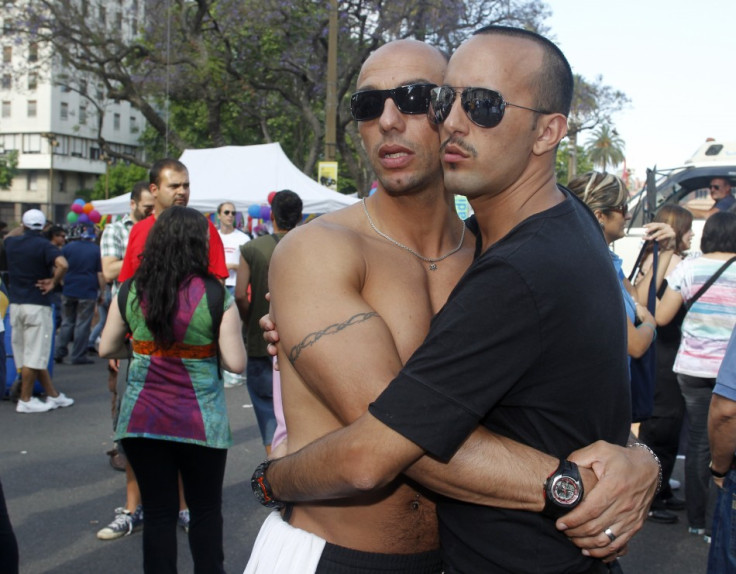Homophobes Might Be Secretly Attracted To People Of The Same Sex

Homophobes are a group of people who have a negative feeling towards homosexuality, but new research claims that people who express hatred of gays are secretly more likely to be attracted to the same sex.
Researchers from the University of Rochester, the University of Essex and the University of California in Santa Barbara have discovered that homophobes are actually attracted to the same sex but they do not admit it because they grew up with authoritarian parents who forbade such desires. They found this when they conducted a series of psychology studies.
The researchers assert that people who define themselves as straight and who hate homosexuality are often attracted to the same sex. They believe that homosexual people remind them of similar tendencies within themselves.
"Individuals who identify as straight but in psychological tests show a strong attraction to the same sex may be threatened by gays and lesbians because homosexuals remind them of similar tendencies within themselves," said Netta Weinstein, a lecturer at the University of Essex, in a statement.
Homophobes Who Were Secretly Gay: From FBI Boss J. Edgar Hoover to Chistian TV Preacher Ted Haggard
Researchers conducted four separate experiments in the United States and Germany, with each study involving an average of 160 college students. To explore participants' explicit and implicit sexual attraction, the researchers measured the discrepancies between what people say about their sexual orientation and how they react during a split-second timed task.
During the experiment, students were shown words and pictures on a computer screen and asked to put these in "gay" or "straight" categories. Before each of the 50 trials, participants were subliminally primed with either the word "me" or "others" flashed on the screen for 35 milliseconds. They were then shown the words "gay," "straight," "homosexual," and "heterosexual" as well as pictures of straight and gay couples, and the computer tracked precisely their response times. A faster association of "me" with "gay" and a slower association of "me" with "straight" indicated an implicit gay orientation.
A second experiment, in which subjects were free to browse same-sex or opposite-sex photos, provided an additional measure of implicit sexual attraction.
Through a series of questionnaires, participants also reported on the type of parenting they experienced growing up, from authoritarian to democratic. Students were asked to agree or disagree with statements like: "I felt controlled and pressured in certain ways," and "I felt free to be who I am." For gauging the level of homophobia in a household, subjects responded to items like: "It would be upsetting for my mom to find out she was alone with a lesbian" or "My dad avoids gay men whenever possible."
Finally, the researcher measured participants' level of homophobia - both overt expressed in questionnaires on social policy and beliefs, and implicit, as revealed in word-completion tasks. In the latter, students wrote down the first three words that came to mind, for example for the prompt "k i _ _". The study tracked the increase in the amount of aggressive words elicited after subliminally priming subjects with the word "gay" for 35 milliseconds.
Across all the studies, participants with supportive and accepting parents were more in touch with their implicit sexual orientation, while participants from authoritarian homes revealed the most discrepancy between explicit and implicit attraction.
Researchers found that homophobic people are actually attracted to the same sex. They claim that these individuals risk losing the love and approval of their parents if they admit to same sex attractions, so many people deny or repress that part of them.
"In a predominately heterosexual society, 'know thyself' can be a challenge for many gay individuals. But in controlling and homophobic homes, embracing a minority sexual orientation can be terrifying," said Weinstein.
The research also sheds light on high profile cases in which anti-gay public figures are caught engaging in same-sex sexual acts. The authors write that this dynamic of inner conflict may be reflected in such examples as Ted Haggard, the evangelical preacher who opposed gay marriage but was exposed in a gay sex scandal in 2006, and Glenn Murphy, Jr, former chairman of the Young Republican National Federation and vocal opponent of gay marriage, who was accused of sexually assaulting a 22-year-old man in 2007.
"This study shows that if you are feeling that kind of visceral reaction to an out-group, ask yourself, 'Why?'" says William Ryan, professor at the University of California in Santa Barbara. "Those intense emotions should serve as a call to self-reflection."
MUST READ: 'Mass Effect 3' Gay Sex Controversy: EA Defends Itself Against Anti-Gay Campaign
MUST READ: 'Mass Effect 3' Gay Sex Controversy: AllOut.org Credit EA for Supporting LGBT Campaign
© Copyright IBTimes 2025. All rights reserved.




















